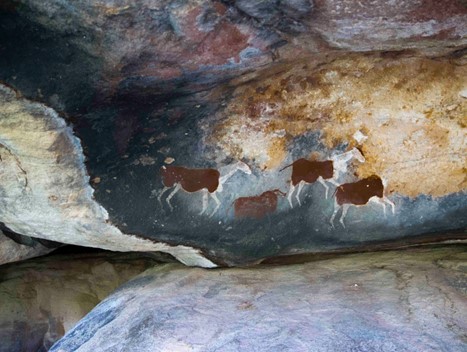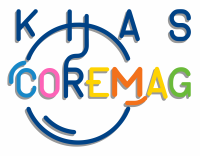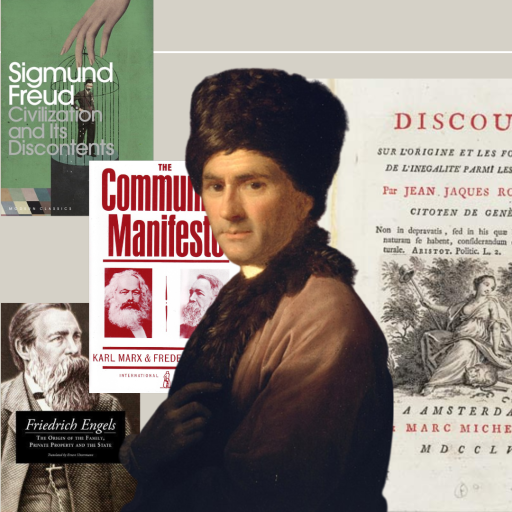Rousseau’s view of progress and civilization in comparison to other thinkers
11 Eylül 2022Taia Anjouk
In Jean-Jacques Rousseau’s Discourse on the Origin of Inequality (1755/2009), Rousseau explains that civilization is a result of a mistake that should never have happened because humans are happiest and most free when they are in a state of nature where there is no ownership of property. When men started claiming lands and became greedy, freedom was taken away from humans and resulted in laws and authorities that would eventually make an unhappy civilized human being until he/she dies (pp. 83-84). His point of view is unique in theory, and contemporary as an abstract thought. He writes about the contrast between the civilized and the savage man, where his portrayal of the savage man is ideal. He also argues that humans are most free and happy at the savage state, and that civil society is full of inequality and laws restricting and complicating the simple, peaceful and savage state of man. Rousseau’s view on progress and civilization is different from other thinkers, in that man is only free in his primitive state of nature where he is driven solely by animal instincts and the means of survival, as opposed to Freud, who argues that man has an internal struggle between aggression and guilt that result in the building of civilization, to Engels who focuses on the foundations of family as an ever-changing social institution and to Marx who sees class struggle as the main trigger of progress.
It is not adequate to draw facts about progress and the origin of inequality based on the deduction that primitive man only behaves according to instincts. Freud (1930/2002) argues in his book Civilization and its Discontents that man is not as simple as being in a primitive state with no desire but to eat and survive. For Freud it is not possible for a man to be responsible for himself at all times since he is in constant psychological conflict. Humans have aggressiveness that they can suppress only by the feeling of guilt they have due to consciousness, the ego and the super ego, and with time this institutes the laws they create in order to maintain order for a society of naturally aggressive people. “Another question concerns us more nearly. What means does civilization employ in order to inhibit the aggressiveness which opposes it, to make it harmless, to get rid of it, perhaps?” (p. 273). This is different from Rousseau’s approach since he did not dig deep into the human mind to analyze and see beyond what is apparent. In addition, Rousseau claims that men lost their freedom and equality the moment one of them claimed a piece of land (p. 55). But this moment isn’t specified in human history, and even though this is clearly an analogy, Rousseau himself did not predict a time of this tragical moment in human history. Moreover, because he is not born a savage man, there is much more imagination in his specific approach towards an ideal savage man (Tonyali, N, 2020). Although, he did talk about its possible relation to religion and God’s will as he explains how religion teaches that God meant for men to be taken out of the state of nature and be unequal (pp. 24-25). This might be his reference to the time when religion along with creation of life began.

Nonetheless, Rousseau emphasized how in his discourse he will be pursuing the hypothetical and conditional reasoning devoid of corrupt history books and regardless of what religious scriptures indicate about men never having been in a state of nature (pp. 24-25). Since Rousseau also agrees that man has other aspects than what religion had taught, even if his claim is about the state of nature, this proves that Freud’s argument about natural aggression and complexity of man could help explain a lot about the state of nature Rousseau is trying to trace back.
Furthermore, it is fundamental to understand that progress and inequality can be explained by understanding human family relations change over time. In the light of Morgan’s research, intensive knowledge and fieldwork amongst Native North Americans, and study of Roman times and classical Greek, Engels (1884/1981) discussed in his book The Origin of the Family, Private Property and the State, how jealousy distinguishes the animal family from the primitive man’s family; and even in that aspect polygyny or monogamy are forms of family found in higher vertebrates in which only the male is allowed to have more than one partner. This male jealousy only results in the seclusion of the family and, thus, hurdles the course of progress into a higher social form (p. 99). Nevertheless, in order for humans to progress they need to form larger groups, and the feelings of jealousy and possessiveness must have developed later. In the savagery stage and lower stage barbarism, group families (involving the intermarriage of several men and women without commitments) recognized descent from the mother’s side whereas the father of a child was anonymous. This created the term “mother right” where, for example, the inheritance was solely through the mother (p. 106). This evidence suggests that women back in the savagery and barbarism stages had different family roles. Today the conventional civil family is monogamian which involves only two partners and their offspring.
Correspondingly, according to the unilineal fashion of progress in Morgan’s model, it was inevitable that progress goes in the direction of the monogamy. The first trace of the monogamian family was among ancient Greeks, in contrast to their mythology’s portrayal of respected and free goddesses, the heroic age had introduced the domination of man over woman (pp. 125-126). Engels saw that at some point in Morgan’s unilineal model of human history, woman’s position in family changed to be inferior, probably due to enslavements acts of wartime resulting in the origin of inequality Rousseau was trying to investigate. Contrary to Rousseau’s perception that the mistake of inequality is there to last, in light of Morgan’s positive unilineal model of progress, Engels predicts the monogamian family will change along with social change to attain the equality of the two sexes.
On the other hand, society has hierarchies other than family in which inequality exists and in which progress is triggered. Marx, K., & Engels, F. (1848/1969) emphasized how class struggle had always been part of early human history where oppression and slavery existed and continue to exist in different forms to this day. The transition from the feudal system to industries and then the modern markets gave rise to the bourgeoise class which dominates through cash flow and capital, and this was a form of progress into a system where money exchange rules above everything else (p. 15).
The emergence of the bourgeoise and the modern market did not eliminate inequality but rather disguised it under the notion of freedom. In bourgeoise society, each occupation was exploited and turned into labours with minimum wages (p. 16). As it is apparent today, it is true that there are constitutional human rights in name, but the working class is still exploited by their superiors who own businesses and invade taxes. This is extremely similar to Rousseaus’s views on the origins of inequality in the aspect of property ownership. However, Marx and Engels envision a new political system as a result of the inevitable union of exploited wage workers (Trades’ Unions) where capitalism and class divisions are overthrown for good, and the middle class does not repeat the mistakes of the past by gaining private ownership over property. Rousseau was only looking into the past and did not attempt to create a different future, even if it was a theoretical vision. From his perspective, it would have been better altogether if man had remained savage.
Rousseau’s views challenged classical sociological thinking by trying to reach the free and happy state of primitive man through hypothesizing ideal conditions of the savage man’s nature; Freud analyzed the human consciousness to understand the aggressivness and sense of guilt humans have; Engels drew a connection between family forms and progress of society and Marx along with Engels managed to envision a system of fairness, devoid of class struggle and private ownership of property. Humans have a complex struggle between guilt and aggressivness while leads to the creation of institutions and laws, but family relations also influence social change. Moreover, society develops inequality due to class struggle that is the result of private ownership and exploitation of the common people. While the state of nature may be idealistic, it is a unique view of what it means to be truly happy and free.
References
- Rousseau, J. J. (2009). A discourse on the origin inequality (F. Philip, Trans.). (P. Coleman, Ed.). Oxford University press. (Original work published 1755)
- Engels, F. (1981). The origin of the family, private property and the state: In the light of the researches of Lewis H. Morgan. New York : International Publishers, (Original work published 1884)
- Marx, K., & Engels, F. (1969). Manifesto of the Communist Party (S, Moore., & F, Engels, Trans.). Marx/Engels Selected Works, Vol. One, Progress Publishers, Moscow (Original work published 1848)
- Freud, S. (2002) Civilization and its Discontents in Classical Sociological Theory (C. Calhoun, Ed.). Malden : Blackwell Publishing. (Original work published in 1930)
- Tonyali, N., History of Humankind KHAS 103 Writing Session, Kadir Has University (December 11, 2020)

